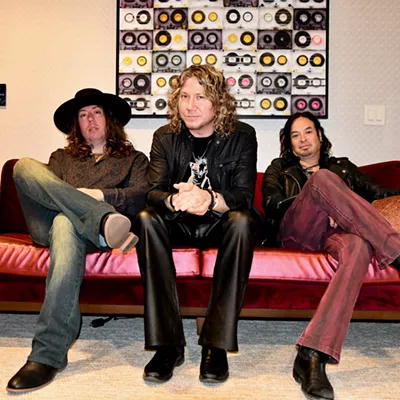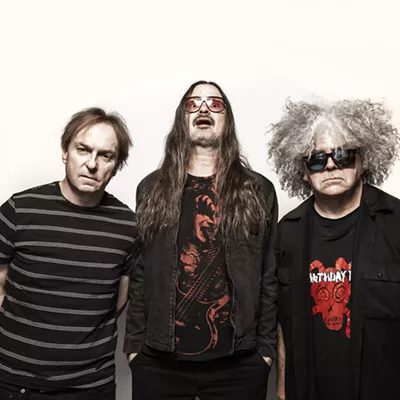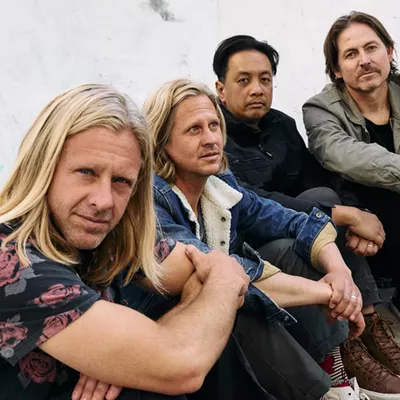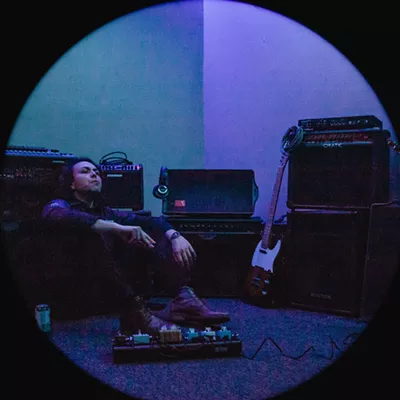After evolving from a guitar and upright bass duo into a full electric band, Phoenix's Andrew Jackson Jihad was ready to keep on that track.
But the band's choice of producer, Grammy-nominated John Congleton (the Walkmen, the Mountain Goats, Okkervil River), urged them to turn back to their roots and record a rowdy and raw acoustic album.
"The idea going into the recording was to make a record that was mostly acoustic. It was actually kind of regressive for us. After Knife Man, we toured as an electric band and were ready to make an electric record," says singer/songwriter/guitarist Sean Bonnette. "John in his brilliance suggested we make a really brutal acoustic record, like the Violent Femmes' first album. Sonically it's crunchy. There are some parts of it that sound really pleasantly blown out."
The so-far-untitled record will be out in the spring, the fifth proper album in the decade since Bonnette and bassist Ben Gallaty formed Andrew Jackson Jihad, joining a host of EPs and split 7-inch singles. Since the outset, with the quirky/funny songwriting and pell-mell tempo, Andrew Jackson Jihad has been filed under folk-punk, a label the band has mixed feelings about.
"As far as the term folk-punk, I consider us something different than that. I would like us to be known as just a weird, cool band. But I don't mind when people use that term because it tends to be favorable," Bonnette says.
Bonnette and Gallaty formed the band when they were co-workers at The Willow House, a now-defunct central Phoenix coffee shop that stood out for its eccentricity years before the downtown art scene began taking hold.
"I was in a junior high idea for a band. We'd get together and play that one Korn riff we knew. But after that I started writing my own songs. He was in a band called the Sub-Standards and being an 18-year-old kid I said, 'Hey, listen to my songs,'" Bonnette says. "He whipped out an upright bass his dad had permanently loaned him and we started playing."
Those first songs—filled with Bonnette's sharp, witty lyrics—were captured on the 11-song Candy Cigarettes and Cap Guns, self-released in 2005. "It was before I found the voice that I'm really comfortable with songwriting-wise. A lot of them are very funny. I wanted people to listen to the lyrics and the easiest way to do that was with some over-the-top humor," Bonnette says.
Next came People That Can Eat People Are the Luckiest People in the World, the band's first for Asian Man Records, with songwriting that downplayed the humor while still remaining splendidly off-kilter.
"It's a continual progression. I always hope to be changing the way I write songs. With the first stuff, I eventually got tired of the go-to compliment for our band being 'You guys are hilarious.' The point I started getting annoyed with that was when I started writing serious songs and stopped using humor as a crutch and more as a condiment. It allows you to talk about some really personal things if you end it with a punch line," Bonnette says.
The latest project found Bonnette turning his songwriting to the long battle with cancer his grandfather was fighting.
"I wouldn't say there's a theme to any of the songs in particular, but a lot of them have to do with getting ready for a death. It's a lot of different moments in the songs that helped me work through it, in different modes of thinking," he says.
"A lot of it was pre-grieving songs," he says. "With a person who has a long illness, the grieving process begins even before they pass. I don't think there's a lot of anger in the record. My angry moments over the death were captured in one night that wasn't recorded. I think it's a really positive record. A lot of it is about the power of forgiveness.
"There were things that happened around the time of his death that helped me forgive other people in my life. Not like a life's-too-short thing, but that life will be better with grace in it," he says.
Leaving Phoenix for Dallas, Andrew Jackson Jihad switched up their usual recording process, banging out the tracking and mixing in just 10 days.
"We've never recorded a record with such a limited time frame. Usually we'll record in Mesa and track basic stuff in a couple days and over the next few weeks come into the studio to do overdubs," Bonnette says. "It's cool that it was cohesive and I like doing things that way. We had a lot of time to focus. The main thing was recording, and so many good ideas came late at night watching a movie at the practice space we rented."
Joining Bonnette and Gallaty in the studio were the now-official band members Preston Bryant on guitar and keys and Deacon Batchelor on drums. The songs were new and changing on the fly, some chopped and rearranged from another project Bonnette put on the back burner. "Some of the songs I completed really close to recording. I like having enough song skeletons around to work on impulse, finish some songs on the spot," he says.
To tide fans over before the new record, the band released its first live album, Live at The Crescent Ballroom, in September. Recorded last November at the end of the long tour for the 2011 record Knife Man, the 25-song album is a thrilling documentation of Andrew Jackson Jihad's onstage energy.
While the band has played Tucson numerous times (including an opening set at Plush for Bob Log III when Bonnette was underage and had to leave after playing), this tour brings Andrew Jackson Jihad to Solar Culture for the first time. "We love playing all-ages shows. Those are the best kind. Young people like music more than other people," Bonnette says.
And while a few new, unheard songs will be sprinkled in, the set will be mostly a mix of fan favorites picked from all the band's albums.
"It's really fucking hard to not play these songs ... you want to present new stuff to the crowd, but you don't want to bore them with a bunch of songs they haven't heard before. Nor do you want them to film it through an iPhone on a sloppy night and put it on YouTube and that's the first anyone hears of it. I'd really like the definitive version to be the first ones people hear, or if they hear it live," Bonnette says.






